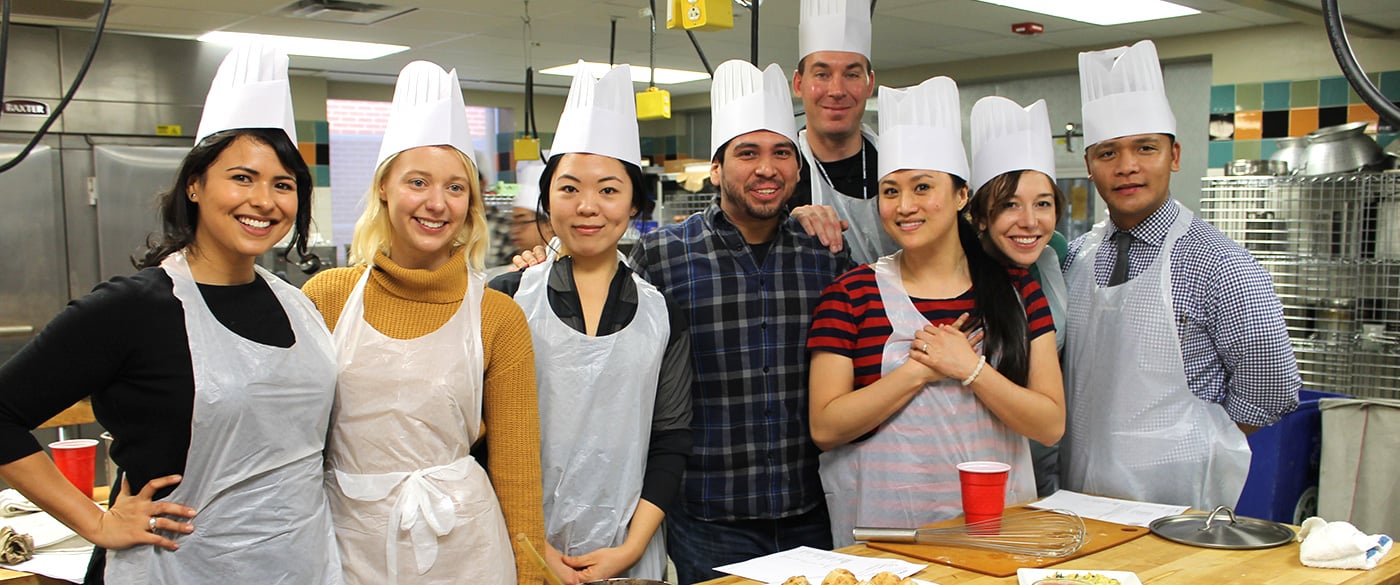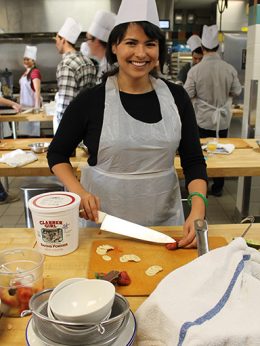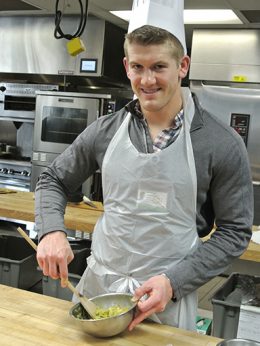 Students from the Culinary Medicine/Dental Medicine present a meal they prepared
Students from the Culinary Medicine/Dental Medicine present a meal they prepared
On a recent Friday, Gabriela Andrade, a second-year dental student from the CU Anschutz School of Dental Medicine (SDM), was putting the finishing touches on a group project. She stacked sandwiches on a platter, and her group lined up to explain to their instructors and classmates about an extra ingredient they added to the hummus: chipotle peppers.
Because of a program funded by Delta Dental of Colorado to support interdisciplinary education among health professionals, called the Frontier Center, the classmates, 17 CU dental and medical students, join culinary nutrition chefs side-by-side each week in a Culinary Medicine/Dental Medicine elective course. The class is a venture of the School of Medicine (SOM), the SDM and the College of Culinary Arts at Johnson & Wales University (JWU). Every Friday the students gather in JWU’s production kitchen to talk about and taste food—for academic credit.
As Andrade’s group described how the peppers contributed a pleasing heat and flavor, as well as added nutritional benefits, their instructor chimed in with suggestions for ingredient substitutions. Then the class heard the words they had been waiting for all afternoon: “let’s eat."
 Gabriela Andrade, a School of Dental Medicine student, practices her knife skills
Gabriela Andrade, a School of Dental Medicine student, practices her knife skills
An interdisciplinary education in nutrition
The class, which will meet for eight Fridays, consists of a two-hour discussion and quiz on nutrition, followed by hands-on training in cooking techniques, including knife skills, working with fresh produce, and making healthful substitutions in recipes. Students work in small groups to produce different parts of a complete meal: appetizers, salads and a main course. Clinical nutrition students from JWU are on hand to provide guidance and experience.
 Tamanna Tiwari, a clinical instructor at the School of Dental Medicine
Tamanna Tiwari, a clinical instructor at the School of Dental Medicine
The interdisciplinary focus of the course is one of its primary benefits, according to Tamanna Tiwari, MPH, MS, BDS, a clinical instructor at the SDM. “As the first School of Dental Medicine to offer an elective for Culinary Dentistry, we are adding to our innovative, interdisciplinary curriculum,” she said. “Our dental students work as a team with medical students. They take ownership of projects together.”
The course aims to fill a gap in medical education by providing students with the latest research on clinical nutrition and instruction on how to communicate lessons about nutrition to their future patients. “Diet has a huge effect on the whole person,” said Mark Deutchman, PhD, SOM professor. “This class fills in a knowledge gap. It will make our students better practitioners and help them to address all aspects of a patient's health.”
Adding tools to their toolkits
For medical student Nick Stephanus, the class is an opportunity to add more tools to his toolkit. “In primary care, many illnesses are chronic, and can be managed by careful monitoring of one's diet,” he said. “This class teaches us how to give good advice to future patients, so that physicians can say more than just ‘manage your calorie intake.’”
 Mark Deutchman, professor at the School of Medicine
Mark Deutchman, professor at the School of Medicine
Andrade, too, plans to use the skills she gains in the class to help her future dental patients. “I plan to work with Hispanic populations and with patients with a lower socio-economic status,” she said. “They may not have had a lot of education about nutrition, and this class will help me to better communicate tips for a healthier lifestyle and oral health.”
Although the Culinary Medicine/Dental Medicine course focuses on skills that students can use to help their future patients, the class agrees that they are already benefiting by taking their work home. The skills they are learning have allowed them to cook meals that are more nutritious for themselves. They’ve also cultivated camaraderie with the nutrition students from JWU, who will go on to work in the medical field as dietitians and clinical researchers.
“The JWU students enjoy the interchange of information with CU,” said Marleen Swanson, RD, the department chair of the JWU Culinary Nutrition program. “They glean a better understanding of the medical world through case studies that they review with CU students.”
 School of Medicine students like Nick Stephanus learn cooking skills and how to communicate nutrition tips to their patients
School of Medicine students like Nick Stephanus learn cooking skills and how to communicate nutrition tips to their patients
Following their taste buds
With a growing awareness of the important role nutrition plays in preventive care, and the lack of nutrition education in medical and dental schools across the country, the Culinary Medicine/Dental Medicine course will make a significant contribution to medical education. The interdisciplinary approach at CU Anschutz, along with the partnership with JWU, are producing medical and dental professionals who are knowledgeable and enthusiastic about healthy eating.
For good reason. The smells wafting from the kitchen classroom every Friday are mouthwatering, and the energy in the room is contagious. Both Andrade and Stephanus look forward to the class each week. “Cooking is an experiment,” Andrade said. “I’m learning as I go, but I’m also following my taste buds.”




